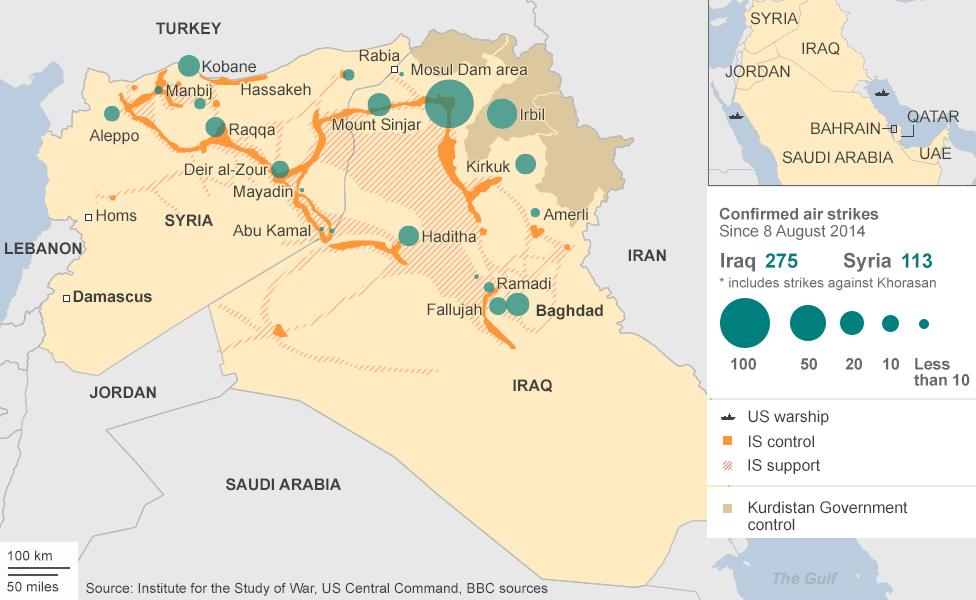Kobane: Islamic State battles to encircle Syrian Kurds
- Published
Quentin Sommerville, near the border, says he can hear frequent explosions
The Kurdish defenders of the Syrian border town of Kobane have held back advancing Islamic State fighters, with the US supplying air support.
The Kurds repulsed a pre-dawn attack and still control the town's border crossing point with Turkey.
Correspondents say the crossing point is a vital supply and exit route.
The Pentagon reports that US planes have been bombing IS targets to the north and south of Kobane since Friday.
US and other aircraft from the international coalition also carried out air strikes on IS targets inside Iraq as well as dropping supplies to Iraqi government forces at Baiji, where Iraq's biggest oil refinery is located.
In Iraq's Anbar province, officials reportedly made an urgent appeal for military help against IS.
Haze and dust
As the sounds of battle continued on Saturday, haze and dust obscured Kobane, making air strikes more difficult but not impossible, the BBC's Quentin Sommerville said in a tweet, external from the Syria-Turkey border.
The Kurdish militiamen have pushed back the latest IS advance but the militants are being easily resupplied from the south and the east and are able to launch further attacks, our correspondent says.
Amid the sound of gunfire, black plumes of smoke could be seen rising from the south and west of the town, another foreign journalist at the scene, Derek Henry Flood, tweeted, external.
According to the Pentagon, the new US air strikes on IS targets at Kobane hit an IS fighting position, damaged a command and control facility, destroyed a staging building; struck two small units of fighters; and destroyed three lorries.
Several hundred civilians are still believed to be in Kobane. UN envoy for Syria Staffan de Mistura has warned they could be massacred by IS if the town falls.
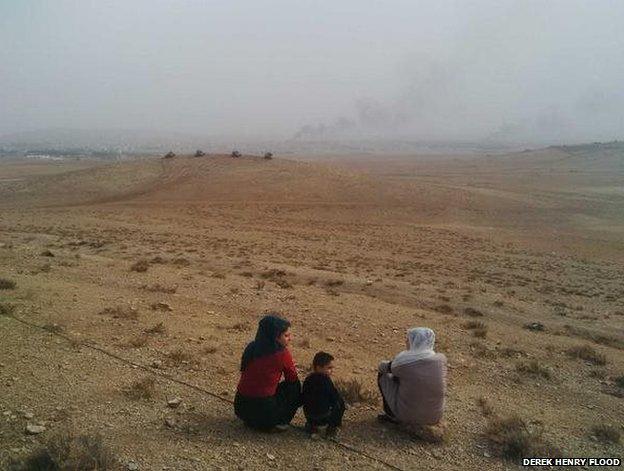
Smoke rises over Kobane on Saturday as seen from the Turkish border
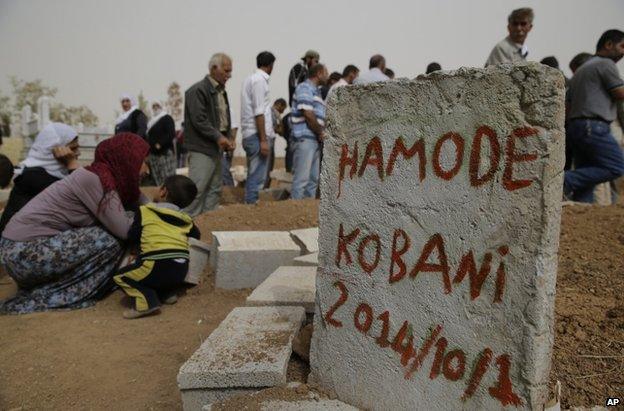
The fresh gravestone of a Kurdish fighter buried near the Turkish town of Suruc, across from Kobane
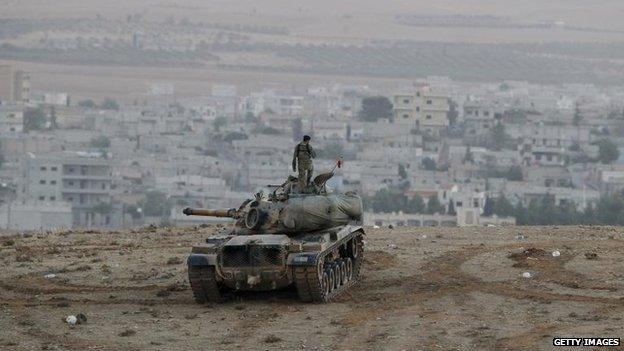
Turkish forces are ranged on the border but have not crossed
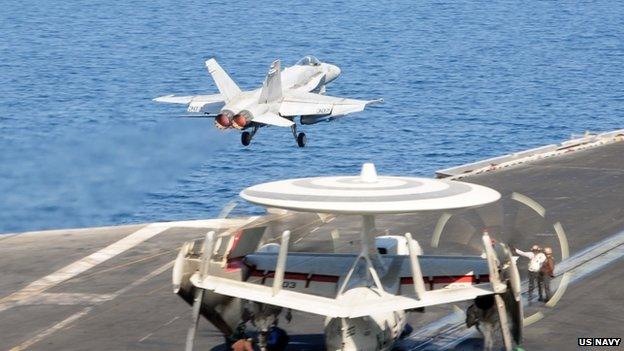
An F/A-18C Hornet leaving the flight deck of the aircraft carrier USS George HW Bush on Friday
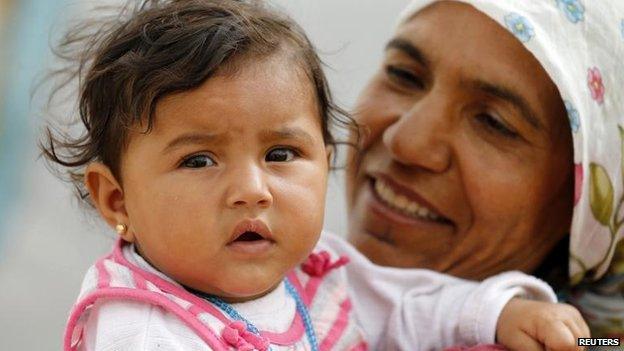
Tens of thousands of refugees have fled over the border into Turkey
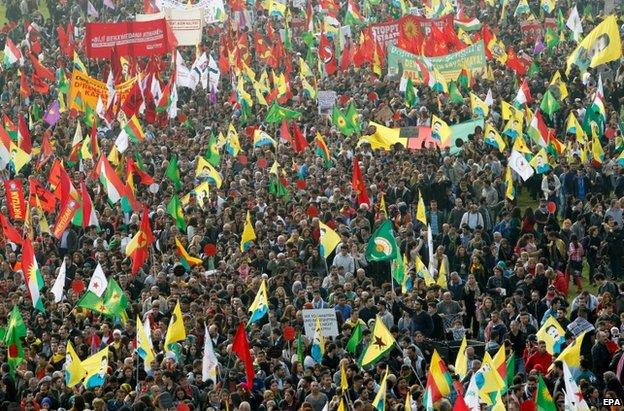
There have been protests across Europe in support of Kobane's Kurds, including here in Duesseldorf
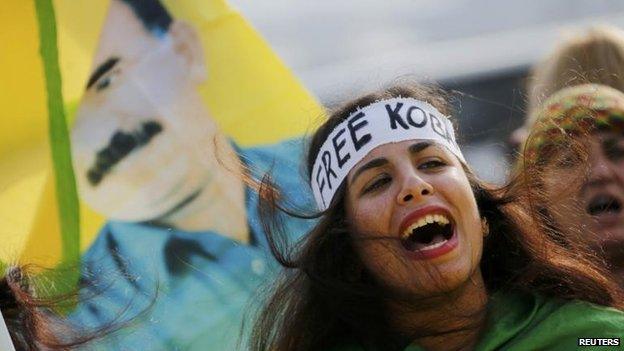
Images of jailed Turkish Kurdish leader Abdullah Ocalan could be seen at the rally in Duesseldorf
Since the IS offensive against Kobane began in mid-September, some 500 people have been killed and up to 200,000 have fled across the border into Turkey.
Mr de Mistura called on Turkey to allow Kurdish volunteers to cross into Syria with equipment "to be able to enter the city to contribute to a self-defence operation".
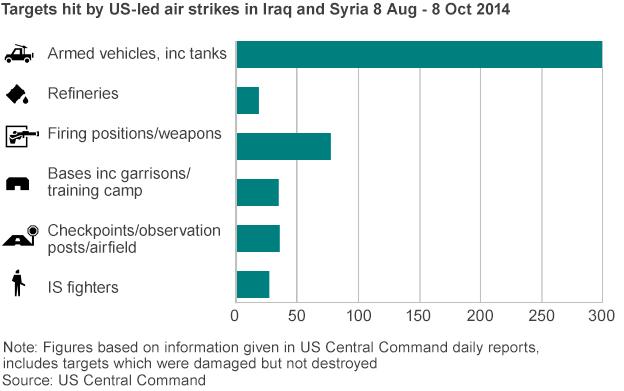
Turkey has ranged its military forces on the border but has so far ruled out any ground operation on its own, and has refused to allow Kurds in Turkey to cross the border to fight.
Accusing Turkish President Recep Tayyip Erdogan of inaction, Kurdish refugees from Kobane told Reuters news agency they feared they would be unable to return to their homes.
"If the United States helps us, we could return," said one. "If the United States is willing to help, not like Erdogan, we could return today."
At least 20,000 Kurds living in Germany have marched in the city of Duesseldorf to highlight the threat to Kurds in Kobane.
Air drops
US and Dutch aircraft attacked IS targets near the towns of Tal Afar and Hit in northern Iraq, the Pentagon said in a statement, external.
In the operation in the Baiji area, food, water and ammunition were dropped to Iraqi security forces.
At least 14 people died in violence in Iraq on Saturday: four injured soldiers were killed when their ambulance was attacked in a "friendly fire" incident near Baquba while a suicide bomber killed at least seven people in a market in Meshahda, near Baghdad.
In Anbar, the provincial council asked for US ground troops to help fight IS, the Dubai-based Iraqi TV channel Al-Sharqiyah reports.
The vice-president of the council, Faleh al-Issawi, warned Anbar could "fall in 10 days".
Prime Minister Haider al-Abadi has repeatedly ruled out any foreign ground troops in Iraq.
John Simpson on the IS front line with the Iraqi army
IS fighters control large stretches of territory in Syria and Iraq. The group is known for its brutal tactics, including mass killings, abductions of members of religious and ethnic minorities, and the beheadings of soldiers and journalists.
